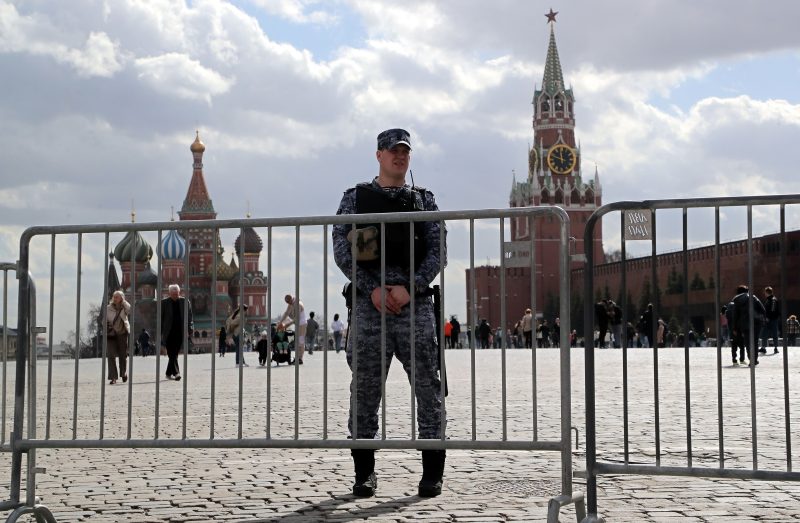When President Biden proposed an additional $24 billion in supplemental funding for Ukraine in August, Moscow spin doctors working for the Kremlin were ready to try to undermine public support for the bill, internal Kremlin documents show.
In an ongoing campaign that seeks to influence congressional and other political debates to stoke anti-Ukraine sentiment, Kremlin-linked political strategists and trolls have written thousands of fabricated news articles, social media posts and comments that promote American isolationism, stir fear over the United States’ border security and attempt to amplify U.S. economic and racial tensions, according to a trove of internal Kremlin documents obtained by a European intelligence service and reviewed by The Washington Post.
One of the political strategists, for instance, instructed a troll farm employee working for his firm to write a comment of “no more than 200 characters in the name of a resident of a suburb of a major city.” The strategist suggested that this fictitious American “doesn’t support the military aid that the U.S. is giving Ukraine and considers that the money should be spent defending America’s borders and not Ukraine’s. He sees that Biden’s policies are leading the U.S. toward collapse.”
The documents — numbering more than 100 and dating between May 2022 and August 2023 — were provided to The Post to expose Kremlin propaganda operations aimed at undermining support for Ukraine in the United States, as well as their scale and methods. The files are part of a series of leaks that have allowed a rare glimpse into Moscow’s parallel efforts to weaken support for Ukraine in France and Germany, as well as destabilize Ukraine itself.
Russia has been ramping up its propaganda operations as part of a second front that current and former senior Western officials said has become almost as important for Moscow as the military campaign in Ukraine — especially as congressional approval for further aid has become critical for Kyiv’s ability to continue defending itself.
“It is Russia’s top priority to stop the weapons, so they are throwing things at the wall to see what sticks,” said one Republican staffer on Capitol Hill. “We are seeing a broad-based campaign that has multiple lines of effort, some of which work better than others. The Russians don’t care. They are just trying to seed the environment.” The staffer and other Western officials spoke on the condition of anonymity to discuss sensitive assessments.
The campaign has attempted to paint Ukrainian President Volodymyr Zelensky as corrupt, emphasized the numbers of migrants crossing the U.S.-Mexico border, called for border security to be funded over any aid to Ukraine, and described “white Americans” as the principal losers because of foreign aid, the documents show.
The strategy promotes views from the far-right wing of the Republican Party and calls for some of the messaging to be voiced by American “public opinion leaders and politicians,” one of the documents shows, but it does not name any people who could be enlisted to do that.
Many of the documents contain metadata showing they were written by members of a team working for Ilya Gambashidze, head of the Moscow PR firm Social Design Agency. The United States imposed sanctions on Gambashidze last month for his involvement in “a persistent foreign malign influence campaign” at the Kremlin’s direction, including the creation of websites designed to impersonate legitimate media outlets in Europe, part of a campaign that Western officials have called “Doppelganger.”
Neither Gambashidze nor Kremlin spokesman Dmitry Peskov responded to a request for comment.
The campaign is part of an increasingly sophisticated strategy that has built on nearly 10 years of Kremlin efforts to elevate the voices of populist anti-establishment politicians opposed to the U.S. global role, analysts and former American officials said.
With the far-right wing of the Republican Party essentially blocking passage of any further assistance to Ukraine since August, the Kremlin’s efforts to undermine support for Ukraine may have so far gained more traction in the United States than anywhere else.
“The impact of the Russian program over the last decade … is seen in the U.S. congressional debate over Ukraine aid,” said Clint Watts, the head of Microsoft’s Threat Analysis Center. “They have had an impact in a strategic aggregate way.”
“You would never have previously heard … politicians in the U.S. saying Ukraine is not significant enough and we will not support NATO. On a digital platform, your ability to do these things works.”
Rep. Michael R. Turner (R-Ohio), who chairs the House Permanent Select Committee on Intelligence, said Sunday it was “absolutely true” that some Republican members of Congress were repeating Russian propaganda about the invasion of Ukraine. “We see directly coming from Russia attempts to mask communications that are anti-Ukraine and pro-Russia messages — some of which we even hear being uttered on the House floor,” Turner said on CNN’s “State of the Union.”
Watts said Russia “tells audiences 80 percent of what they are already hearing and 20 percent what they want the audiences to hear. They match the demand for information and then add some of their own information, and over time, that’s highly effective.”
Kremlin efforts to interfere in the U.S. political system first became evident in the run-up to the 2016 presidential elections, when the U.S. intelligence community concluded that Russia had deployed a network of trolls — creators of fake social media accounts — to spread disinformation boosting the presidential campaign of Donald Trump and seeking to sabotage Hillary Clinton’s candidacy, including stories using material hacked from the Clinton campaign. Since then, some social media platforms have sought to tighten scrutiny of hostile state actors, but disinformation campaigns still proliferate.
Plans by Gambashidze’s team refer to using “short-lived” social media accounts aimed at avoiding detection. Social media manipulators have established a technique of using accounts to send out links to material and then deleting their posts or accounts once others have reshared the content. The idea is to obscure the true origin of misleading information and keep the channel open for future influence operations, disinformation researchers said.
Propaganda operatives have used another technique to spread just a web address, rather than the words in a post, to frustrate searches for that material, according to the social media research company Alethea, which called the tactic “writing with invisible ink.” Other obfuscation tricks include redirecting viewers through a series of seemingly random websites until they arrive at a deceptive article.
One of the documents reviewed by The Post called for the use of Trump’s Truth Social platform as the only way to disseminate posts “without censorship,” while “short-lived” accounts would be created for Facebook, Twitter (now known as X) and YouTube.
The Kremlin turned in earnest to undermining American support for Ukraine in January 2023. Sergei Kiriyenko, the Kremlin’s first deputy chief of staff, called in the team of political strategists already working on campaigns to weaken backing for Kyiv in Europe, including Gambashidze, and asked them to expand their efforts, the documents show. The strategists employ dozens of troll farm employees and translators.
The Moscow spin doctors were soon ordered to create media content for Americans that would promote corruption allegations involving the Ukrainian leadership — “the sale and theft of weapons” given to Ukraine, one document shows.
The strategists were told to cultivate an environment in which “Americans are not ready to sacrifice their well-being for the sake of the conflict in Ukraine,” as well as representing Russia’s increasingly close relationship with China as a new threat “created by the U.S.’s own activities.”
When Rep. Matt Gaetz (R-Fla.), a leading opponent of aid to Ukraine, warned of “a dangerous bipartisan consensus that is leading us into war with Russia” and slammed Washington’s initial $40 billion aid package for Kyiv in 2022 as coming “while Americans go without baby formula,” the Russians singled it out for their trolls as an example of the kind of message that should be amplified.
“It’s important to note that for effective work we need to keep fakes to the minimum and realistic information to the max,” one of the proposals by Gambashidze’s team of strategists states. “A constant refrain should be: ‘this is what’s really happening, this is what the official media are not telling you about.’ ”
A spokesman for Gaetz, Joel Valdez, responded to Kremlin strategists invoking the congressman’s statements by noting that Gaetz had been personally sanctioned by Russia in April 2022. Hundreds of House members were sanctioned at that time.
Social media posts and comments were to be created as well as YouTube videos that would stoke racial and social discord in the United States and amplify the themes of “universal poverty, record inflation, a halt to economic growth … the risk of job losses for white Americans, privileges for colored and degenerate people and invalids,” according to the proposal, the metadata of which shows it was written by a member of Gambashidze’s team.
The posts would promote fears that overspending on foreign policy had been to “the detriment of defending the interests of white people in the U.S.” and the idea that “America will lose, despite Biden’s efforts, that we will be drawn into war and our guys will die in Ukraine.”
The strategists wrote numerous recommendations for articles or social media posts, the documents show. One sought to compare the level of homelessness in America with that of Russia and states that the United States is starting to increasingly resemble a “Third World country.” A recommended social media comment from a fictitious American in response to the article states: “I am overcome with anger when another Ukrainian aid package is distributed right before my eyes into the pockets of American and Ukrainian officials. Indeed, it is hard to understand such gestures of ‘help’ when one’s own homeless sit at the feet of passersby [and] sleep under bridges.”
As the Biden administration prepared once again this spring to try to push supplemental funding for Ukraine through Congress, sites linked by Microsoft and other social media researchers to the Kremlin campaign launched fresh attempts to spread misleading content over immigration and the border with Mexico. In one instance, a site identified by Meta as part of the Doppelganger network posted an article about what it called a wave of illegal immigration that it claimed was “undermining the foundation of national security.”
“You just have to push content every single day, Watts said. “It is really the availability of that over time that does work, as someone will stumble over it, a politician or celebrity will find it over time just based on the availability of content.”
The drafts proposed by the strategists reflect themes and narratives visible on the Recent Reliable News network and other related outlets — sites that remain online and that the documents show are controlled by the Kremlin officials working with Gambashidze and other strategists. The texts published were different, according to Microsoft’s Threat Analysis Center, which reviewed a sample of the comments and articles created by Gambashidze’s team. Microsoft and the social media intelligence company Graphika said it was possible the draft articles were published on Doppelganger sites later taken down and blocked by social media platforms. Meta, the parent company of Facebook, joined social media research companies to first expose the Doppelganger campaign in September 2022.
As the Kremlin spin doctors worked, they closely monitored opinion polling in the United States and a decline in support among Americans, especially Republicans, for Ukraine. They also conducted twice-monthly surveys with a mechanism they called “river sampling” — conducting internet polls through online advertising and social media networks such as Facebook and TikTok. The results, showing small declines in support for Ukraine, seem wholly unreliable but were passed along to the strategists’ Kremlin masters as measures of success.
Fake news articles alleging Zelensky’s corruption pushed out by Russian-linked websites during the congressional debates on assistance for Ukraine in the fall have resonated. One of the most successful claims was disseminated by DC Weekly — a respectable-seeming internet outlet, which disinformation researchers at Clemson University traced back to domains affiliated with a former American police officer, John Mark Dougan, who has reinvented himself as a pro-Russian journalist in Ukraine’s eastern Donbas region.
Through DC Weekly, a fake news story alleging that Zelensky had bought two yachts with American aid money went viral in November. The claim — patently false and denied by Zelensky’s government — was picked up by far-right congresswoman Marjorie Taylor Greene (R-Ga.), who linked to a story about the rumor on X.
One pro-Ukraine senator, North Carolina Republican Thom Tillis told CNN that the debate on aid had been halted in part because some politicians said they were concerned about the corruption allegations and the notion that “people will buy yachts with this money.”


































